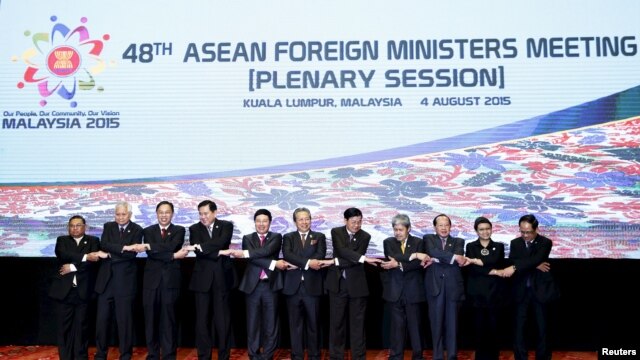
ASEAN foreign ministers pose for group photo in Kuala Lumpur, Malaysia, Aug. 4, 2015.
PHNOM PENH—
When the Association of the Southeast Asian Nations (ASEAN) foreign ministers meet in Malaysia later this week, the ministers are expected to take a strong stance on peace and stability in the South China Sea.
According to documents obtained by VOA Khmer ahead of the meeting, the ministers will stand up for “the freedom of navigation, unimpeded lawful maritime commerce, trade and over flight.”
The ministers are also working toward a so-called “Declaration of Conduct,” that would set the stage for a code of conduct, a set of rules that would put in place mechanisms to avoid conflict in the contentious sea, according to a draft statement, which is expected to be read by the chairman at the conclusion of the Aug. 6 meeting.
The ministers will express concern over China’s land reclamation and construction of land features in the South China Sea and will try to dissuade unilateral action or any use of force that could destabilize the region.
Spirit of 'Good Neighborliness'
In an earlier meeting in July, working groups from ASEAN and China agreed to resolve maritime issues over the sea “in the spirit of good neighborliness” and in accordance with international maritime law.
In that meeting, ASEAN states and China worked on establishing points of contact for emergency communications between senior officials, which could help prevent conflicts form escalating. However, draft documents note a “widening gap” between the diplomatic track and growing tension on the ground.
Each side has agreed to exercise self-restraint to avoid escalating disputes by refraining from populating uninhabited islands and other features in contested areas. Both sides are also working to ensure that the South China Sea issue does not hurt overall ASEAN-China relations.
According to a draft general framework for the Code of Conduct (COC), also obtained by VOA Khmer, proposed by Thailand, the main aim of the COC is “promoting mutual trust and confidence, preventing and managing incidents should they occur, without prejudice to claims. It also helps create a conducive environment for peaceful settlement of disputes, in accordance with international law, including the 1982 U.N. Convention on the Law of the Sea.”
“The COC is not meant to be an instrument to settle disputes,” the draft framework says. “Rather it shall serve as a rules-based framework containing a set of norms, rules and procedures that guide the conduct of the parties in the South China Sea.”
Rules needed
Shihoko Goto, senior associate for Asia at the Wilson Center in Washington, said that reaching a consensus of rules will be critical in upcoming talks, especially given the new attempts at construction made by China.
“There is clearly an understanding among all parties involved that the current situation of unclear rules, coupled with mounting tensions, must be resolved soon,” she said. “Yet the Tianjin meetings demonstrated just how difficult it will be to reach that common goal.”
“One positive step forward in the latest Tianjin meetings was to establish a ministerial hotline to deal with emergencies,” Goto said. “But the ongoing difficulties in establishing a COC may have actually widened the divide among those countries involved and aggravated tensions.”
The U.S., meanwhile, also wants to see a deal reached, she said.
“Given that many ASEAN nations are interested in reaching a solution soon with an eye to building good relations with China, U.S. interest will also be in being part of international efforts to reach a consensus and be part of the endeavors to adhere to global standards,” said Goto.
“One question is how the Philippines going into arbitration against China in the Hague may conflict with those looking to further relations with China,” she said. “Both do not have to be mutually exclusive.”
Cambodia's role
Cambodia, a member of ASEAN with strong ties to China, could have a role to play in upcoming talks, Goto said.
“This will test the government at adeptness in diplomacy,” she said.
Prime Minister Hun Sen said in a speech on Monday that Cambodia is still interested in mediating the dispute. Cambodia was unfairly attacked after it hosted ASEAN-China talks in Phnom Penh in 2012, he said. Critics at the time said Cambodia had sided with China’s interests, breaking ASEAN’s unified voice and leading to a summit with no results.
“I only need that ASEAN and China continue to negotiate and implement the Declaration of Conduct for the South China Sea and step toward the Code of Conduct, while also encouraging the countries concerned to talk,” Hun Sen said.
Achmad Rizal Purnama, first secretary of the Indonesian Embassy in Washington, said the Code of Conduct will help build confidence between China and ASEAN, but it remains to be seen how it will manage actual situations on the sea regarding ship navigation, potential military incidents and other matters.
The code will take some time to create, however, he said, “To be realistic, it’s not going to be adopted this year.” |
|
